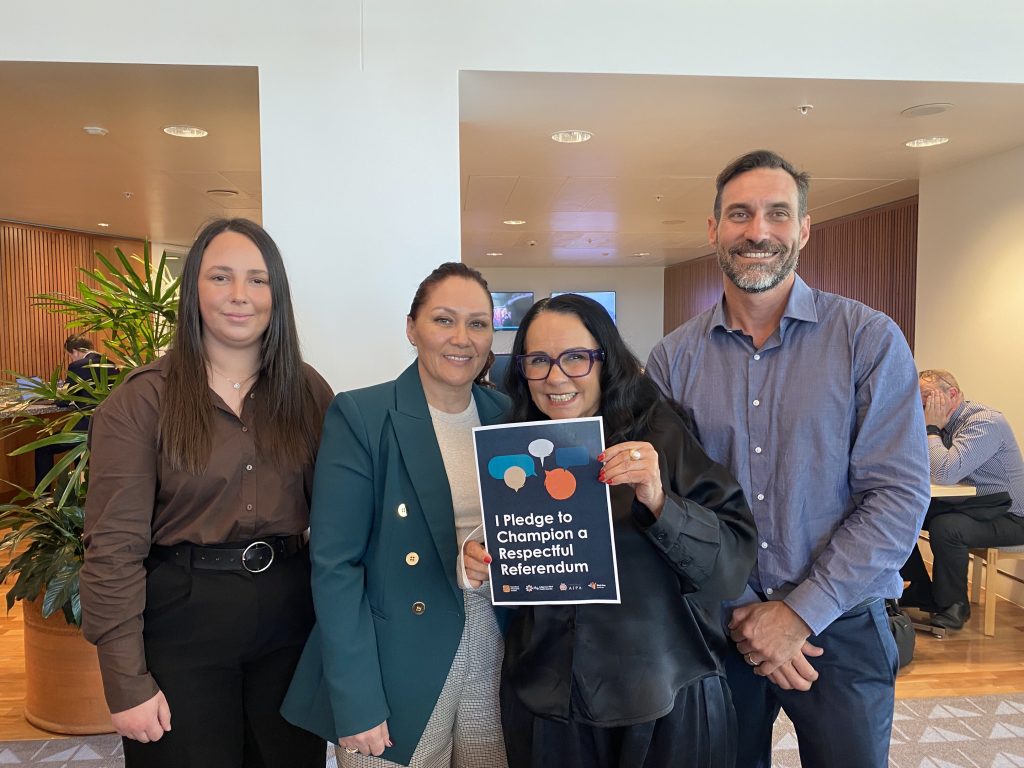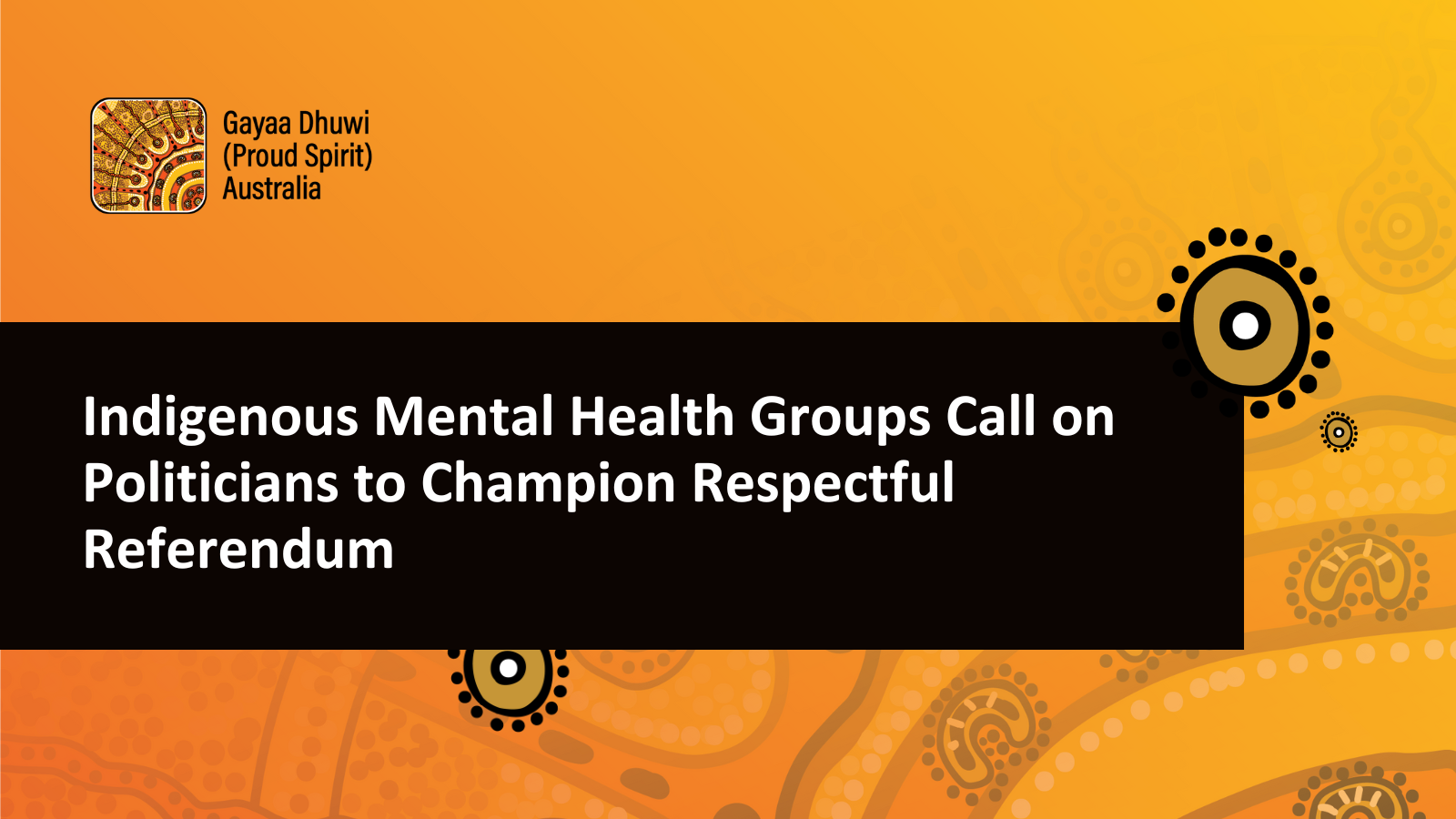Indigenous Mental Health Groups Call on Politicians to Champion Respectful Referendum
6 September 2023
Today, advocates for Indigenous mental health are launching a Respectful Referendum Pledge, a set of principles to encourage more civil and inclusive debate over the Indigenous Voice to Parliament, that aim to reduce social and emotional harms to First Nations people during the referendum debate.
The Respectful Referendum Pledge was co-developed by some of Australia’s leading First Nations mental health groups, including the Australian Indigenous Psychologists Association (AIPA), Indigenous Allied Health Australia (IAHA), the national peak body for Aboriginal and Torres Strait Islander social and emotional wellbeing, mental health and suicide prevention Gayaa Dhuwi (Proud Spirit) Australia, as well as mental health research institute the Black Dog Institute.
Indigenous mental health advocates have been warning the government that the Voice referendum debate would have negative impacts on First Nations social and emotional wellbeing, just as the Same Sex Marriage Plebiscite had negative mental health impacts on the LGBTIQ+ community.
“We are already seeing first-hand the negative impacts of the debate in our communities, in terms of increased psychological distress, increased need for support and increased use of mental health services,” said Dr Clinton Schultz, Gamilaroi/Gomeroi man and Director of First Nations Partnership and Strategy at the Black Dog Institute.
“We know the tonality of the debate has a significant effect on mental health impacts. The more divisive the debate, the greater the impact; the more respectful and inclusive, the lesser the impact.”
The Respectful Referendum Pledge ask politicians to:
- Listen to First Nations people: acknowledging there is no one First Nations identity or perspective, and that no one First Nations person can represent all people, I pledge to listen to a diversity of First Nations peoples to better understand First Nations histories, cultures and experiences.
- Elevate First Nations voices: using the principle of ‘nothing about us, without us’, I pledge to put the voices of First Nations people at the forefront of any campaign activities relating to the Voice Referendum, including in events, panel discussions and media engagements.
- Provide a safe and fair space for First Nations advocates: acknowledging public advocacy is work and comes with associated risks, I pledge to provide safe options for participation, including the option for anonymity in media appearances and a process for support during and after participation.
- Build common ground through shared goals by acknowledging the Human Rights of First Nations Peoples, as specified in the UN Declaration on the Rights of Indigenous Peoples, endorsed by the Australian Government in 2009. As a starting point to any conversation on the Voice, I pledge to affirm the principles of the Declaration, including the rights to self-determination, equality and connection to land, community and culture. In doing so, the question becomes not ‘what’ but ‘how’.
- Set the standard for respectful debate: I pledge to engage in discussions with respect and patience, being open to different viewpoints and experiences. I will avoid personal attacks, offensive language, inflammatory statements, or dismissive behaviour. I will allow time and space for negotiation, be prepared to compromise and display a willingness to engage in reciprocal dialogue.
- Use culturally appropriate language: I pledge to use inclusive, strength-based and culturally appropriate language when referring to First Nations peoples in my campaigning activities, avoiding stereotypes, generalisations or othering language. The Australian Government’s Style Guide can provide principles to adhere to.
- Build trust through action: I pledge to build authentic relationships with First Nations individuals, families and communities by engaging in dialogue and attending cultural events, not as an ‘expert’ but as a guest to the community. Beyond conversation, I pledge to actively support initiatives that promote the rights, well-being, and self-determination of First Nations peoples, based on First Nations ways of knowing, being and doing.
“This Referendum is a much-needed conversation that we should not shy away from. But we should be aware of the risks involved in having the debate and be proactive in reducing its potential harms,” Dr Schultz said.
“These guidelines present a way to move forward together, and protect the social and emotional wellbeing of First Nations people, during and after the Referendum.”
Respectful Referendum Pledge

Media enquiries
Jessica Meades / 0423 938 166 or jessica.meades@ogilvy.com.au
Alex Garred / 0434 616 381 or alex.garred@gayaadhuwi.org.au
About Gayaa Dhuwi
Gayaa Dhuwi (Proud Spirit) Australia is the national peak body for Aboriginal and Torres Strait Islander social and emotional wellbeing, mental health, and suicide prevention. As a community controlled organisation, it is governed and controlled by Aboriginal and Torres Strait Islander experts and peak bodies, working in these areas to promote collective excellence in mental health care.
About Australian Indigenous Psychologists Association (AIPA)
Australian Indigenous Psychologists Association (AIPA) is the representative body for Aboriginal and Torres Strait Islander psychologists in Australia. We aim to improve the social and emotional well-being and mental health of Aboriginal and Torres Strait Islander peoples by leading change required to deliver equitable, accessible, responsive, and culturally sensitive psychological care which respects and promotes their cultural integrity. We advocate for increasing the number of Indigenous psychologists in Australia, to reach population parity and provide leadership on issues related to the social and emotional wellbeing and mental health of Aboriginal and Torres Strait Islander peoples.
About Indigenous Allied Health Australia (IAHA)
Indigenous Allied Health Australia is a national, member-based Aboriginal and Torres Strait Islander allied health organisation. IAHA leads sector workforce development and support to improve the health and wellbeing of Aboriginal and Torres Strait Islander peoples. !AHA also supports the broader allied health workforce and its associate membership of individuals and organisations with expertise, interest, and commitment to improving the health and wellbeing of Aboriginal and/or Torres Strait Islander peoples. Our membership is diverse and works across sectors including but not limited to health, mental health, disability, aged care, education, justice, community services, academia, and policy.
About the Black Dog Institute
The Black Dog Institute is a global leader in mental health research and the only Medical Research Institute (MRI) in Australia to investigate mental health across the lifespan. Areas of strength include suicide prevention, digital mental health, workplace mental health, new treatments, and prevention in young people. We join the dots, connecting research answers, expert knowledge, and the voices of lived experience to deliver solutions that work across the health care system for patients and practitioners alike.


